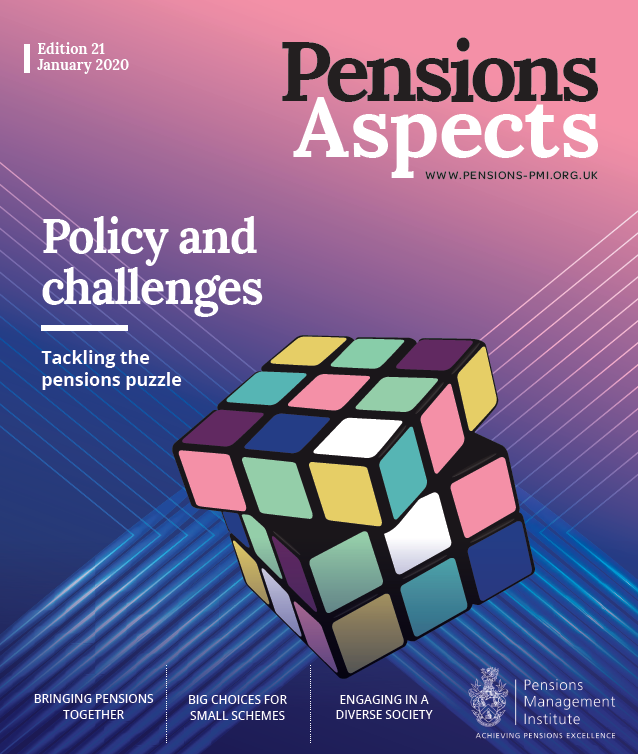
2020 vision New year, new challenges
As we enter the new year, we leave a frustrating period for pensions policy initiatives and look with some optimism to a new Parliament in the hope that many key ideas can finally be brought to fruition. For over three years Brexit has cast its shadow on any attempts to introduce new ideas to the nation’s pensions system. Last year’s short-lived Pensions Bill was a belated attempt to introduce long awaited reforms. It seems reasonable to assume that a very similar Bill will emerge during the course of the new Parliament as it contained little that was politically contentious. However, at this time it is worth pausing to consider the full range of challenges currently facing the pensions industry and the policy choices the new Government could make to address them.

Pensions Aspects January 2020
A growing issue to be addressed is effective workplace pension provision in the expanding gig economy. Automatic Enrolment has proved to be one of the great pensions policy triumphs of the modern era, with over ten million workers now accruing pension savings via a workplace pension scheme. However, it is most effective within a traditional context of individuals having a single full-time job. Over the past decade, it has become increasingly common for workers to have two or more part-time jobs or to be self-employed. Both categories of worker are outside the scope of auto-enrolment, and if the system is to be as comprehensive as originally envisaged, significant changes will be necessary.
The Trades Union Congress (TUC) has long campaigned for all jobholders to be automatically enrolled into workplace schemes. Although an administratively simple solution, it risks including many workers for whom pension saving would not be suitable due to low overall earnings levels. The Taylor review considered options for simplifying pension provision for the self-employed but adequately compensating for the absence of an employer contribution is a problem which remains unresolved.
The Pensions Bill did not contain any provision for allowing Defined Benefit (DB) consolidators to commence work in the UK. This was not surprising: there is a continuing debate concerning the degree of funding that is appropriate for such schemes. Ultimately, if they are required to be as well funded as insurance companies, it would defeat the object of being an alternative to insurance companies. Clearly, this paradox will have to be resolved if the Regulator’s objective of more consolidation is to be achieved.
The pensions industry awaits the Regulator’s response to last year’s consultation exercise on trusteeship and governance. It is generally agreed that the sheer number of registered schemes in the UK – and the number of trustees charged with their governance – is excessively high. In response, the Regulator is promoting a growing drive towards professionalisation, with lay trustees required to demonstrate higher standards of performance. Whether the Regulator is serious about requiring all trustee boards to appoint a professional trustee remains to be seen. In any case, there is no doubt that schemes will be required to show higher standards or be forced into consolidation.
Another debate within the industry concerns the suitability of the sole trusteeship model. The Regulator has never made any secret of its misgivings about this approach, whilst employers and professional trustee firms argue that in many cases it represents the most practical and effective form of governance. Last year, the Association of Professional Pension Trustees (APPT) formed a subcommittee charged with developing a code of conduct for those providing sole trusteeship services. The intention is to persuade the Regulator that sole trusteeship can offer effective standards of diversity and oversight. It will be interesting to see how this project develops.
Another major policy challenge concerns the growth of Collective Defined Contribution (CDC) schemes. The series of fringe meetings held at last year’s party conferences demonstrated that there is strong consensus about the viability of CDC and that policymakers are already looking beyond the single-employer model accommodated in the last Pensions Bill. Expanding CDC into the Master Trust sector would seem a logical development. Currently, offering traditional Defined Contribution (DC) provision conforms well with the auto-enrolment ethos in the induction and accumulation phases. However, decumulation requires members to make an active decision concerning complex options. In contrast, CDC would offer an effective system of defaults at each stage of scheme membership. By default, a scheme pension would automatically become payable with a transfer value available for those preferring to exercise pension freedoms.
The new year offers a series of policy challenges for the new Government. The changing nature of our society has brought about a real need for reform in the pensions system which has been frustrated by the Parliamentary logjam caused by the Brexit debate. It is to be hoped that the new year will finally provide scope for new ideas.
Last update: 26 February 2021
You may also like:






